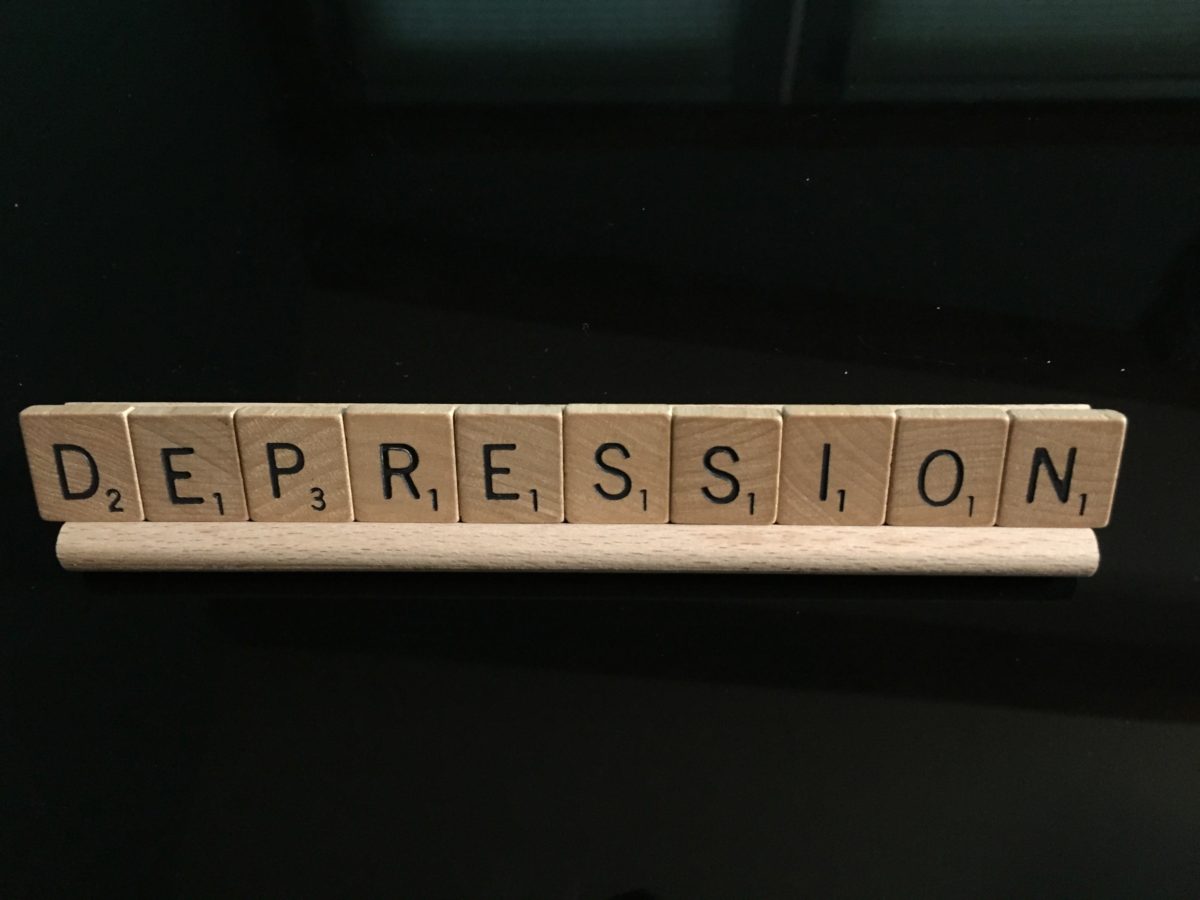If you suffer from or know anyone who suffers from depression, you know how debilitating it can be. Suicidal tendencies, sleep disturbances, nutrition problems, weight changes, and substance abuse are only some of its side effects. The financial toll it takes on society is huge. The toll it takes on people physically and and spiritually is immeasurable.
And an astounding statistics about depression? A Medscape report noted that between 15 and 20 percent of people are affected by this mental illness.
But depression is complicated. It’s often difficult to get a handle on its root causes. You might have genetic vulnerability, a significant life stressor, be taking a depression-triggering medication, experienced a serious and debilitating illness, or an injury. Depression can be a surgery side effect. And it can occur as a side effect of painkiller or drug dependence, or be caused by the use of these substances.
Do you know that it can cause long-term damage to both the brain and body?

What is the brain connection to depression?
Numerous conditions can affect your brain and its mood-regulating process. Grief after the loss of a loved one or a major life-changing event—moving, changing jobs, having a child—can start the depression ball rolling. If not addressed quickly, it can roll out of control.
An August 2019 Bridges to Recovery article covered how major depression affects the brain and body. The article covers the memory decline and sleep-disturbance link between the hormone cortisol (which is released when you’re under stress); the disturbing findings that long-term depression sufferers have 30 percent more brain inflammation than their mentally healthy peers; and the link between hypoxia, or reduced oxygen, and depression.
Those are staggering statistics that have tremendous health consequences.
How can we better deal with, overcome and prevent this threatening illness?
Treating depression—
The toll depression can take on your body is significant. But there are alternatives to taking anti-depressants, which can also have their own negative consequences.
Powerful, effective drug-free alternatives exist that you might want to explore, or use with your prescribed medication to enhance results.
These alternatives are listed under a treatment category referred to as mind-body medicine.
Depression and Mind-Body Medicine—
Mind-Body Medicine is becoming more popular and mainstream, and you may have heard the term and been wondering exactly what it is and what it could do for you or a loved one.
In a nutshell, Mind-Body Medicine is integrative medicine—medicine that takes the whole person and her lifestyle into account—it helps you control your physical and emotional responses to the world around you.
The Center for Mind Body Medicine defines it as medicine that “focuses on the interactions between mind and body and the powerful ways in which emotional. mental, social and spiritual factors can directly affect health.”
It cannot be emphasized enough that the brain is connected to the body, and vice versa. So if we want to have overall, optimal health we must strive to be whole body connected.
A question you might want to take time to ponder is:
“You might be taking care of your body but what about your mind?”
Maybe you’ve recently noticed that you aren’t taking care of your mind, or paying much attention to it outside of knowing what you’re thinking or worrying about at any given moment. Many of us know it’s up there, somewhere above our shoulders, but some of us don’t know what to do with it. Instead of trying to exert control over it, we’re more likely to let it control us. The results can be rapid heart rate, sweaty palms, anger, frustration, fear, and depression.
Mayo Clinic’s Dr. Amit Sood has pointed out that
“Impressive advances in neuroscience research have brought to our attention a startling and exciting discovery—the mind can change the brain.”
Thankfully, after decades of research, scientists have discovered that our amazing brains do have what they call plasticity— the ability to change throughout our lives. Our brain can be soothed and coerced into being more completely engaged. We can become more resilient, happier, more thoughtful, purposeful or intentional.
Many of the techniques I’m going to give you I learned as an undergraduate and grad student. I’ve tried them, applied them, and researched them. They can work, when you practice them properly and faithfully.
I’m going to address 13 activities. With so many, I’ll be breaking them into three posts, so let’s get started today on the first five:
Biofeedback, Guided Imagery, Meditation, Muscle Relaxation, and Music Therapy.
At the end of each section, I’ve provided YouTube video of the activity for you to learn more, participate in or practice.
Biofeedback for Depression—
Physical therapists, athletic trainers, coaches and psychiatrists have used this technique for years. But what exactly is this technique that’s been effective in 150 medical conditions?
Biofeedback is used to help your mind control your body.
But just what in your body are you trying to control?
You’re trying to control involuntary (reflexive) responses. Bodily functions you don’t typically have control over, like blood pressure, muscle tension and heart rate. And a lot of tension can translate into a lot of muscle and joint pain.
How does biofeedback work?
Electrical sensors are placed on different body parts/areas. These sensors then give you audio or visual feedback on your heart rate or how much muscular tension you have in that particular body part.
Then you’re taught how to focus on and “feel” the tension, cause the tension to occur (through voluntary contractions), and then release the tension by deliberately allowing, or causing, the muscle to relax. Patients can lower their breath rate, heart rate and blood pressure using this technique.
You also learn to recognize exactly where you “hold” tension in your body.
When you become more sensitive to your triggers and body tension areas, you are more able to control and overcome the tension when you encounter stressful or stress-triggering situations.
If you’re interested in giving this a try, find a trained biofeedback therapist in your area. You shouldn’t go at this alone, unless you want to snag a book at your local library and try it without the feedback machine bells and whistles. You won’t do any harm trying it this way.
Guided Imagery for Depression—
What makes you relax and smile? Where’s your happy place? A walk in the park? A stroll along the beach? A forest hike?
Guided imagery involves thinking of a personally pleasing scene, vision, or pleasant memory. Then imagine yourself plunked down in the middle of it, with all 5 senses engaged to “experience” this intentional daydream. This relaxation technique is called guided imagery, or visualization.
Try laughing or smiling during your visualization exercise and notice the relaxed, happy (or happier), and contented feeling you’re experiencing. That’s those happy hormones (endorphins) being released into your body, just like they’re released during exercise or crying. Mayo Clinic calls it “an important tool in treating a variety of health problems.” (If you want to give the smiling or laughing affect a try, go ahead and smile or laugh right now, as you’re reading this, and see what kind of feelings that result.)
This is what else Mayo Clinic has to say about it:
“Researchers using positron emission tomography (PET) scanning have found that the same parts of the brain are activated when people are imaging something as when they’re actually experiencing it…Vivid imagery sends messages from the cerebral cortex to the lower brain, including the emotional control center of the brain. From there the message is relayed to the endocrine and the autonomic nervous systems, which affect a wide range of bodily functions, including heart, expiration rates, and blood pressure.”
The endocrine system is a collection of hormone-producing glands. Some of the body systems these hormones control are metabolism, growth and development, tissue function, sleep, mood, sexual function, and reproduction.
The autonomic system is the part of our nervous system that regulates the control of our internal organs and some muscle function.
How’s Is Guided Imagery Done?
First: Relax.
It’s important that you have no distractions, so leave your cell phone in another room and put an “I’m Visualizing Right Now” sign on your closed door!
Put on loose, comfortable clothing and sit or lie in a comfortable, quiet spot. Start with deep, slow breaths in and out through your nose.
Second: Breathe.
Now really concentrate on your breathing. Slowly fill up your lungs and pay attention to the stress leaving your body when you exhale. Think of exhaling your stress away. Don’t allow random, distracting or negative thoughts to permeate your mind or interfere. (This will undoubtedly occur, but it will get better or easier to control with each session.) When you’re done dispelling thoughts, return to focusing on your breathing.
Next: Visualize.
Now comes the fun part! Intentionally choose a desired image and focus on it. It could be an event, location or person. If your mind wanders, bring your focus back with a slow, deep breath. (If you have difficulty conjuring up a scene, choose a pleasing photograph or picture to look at.)
Finally: Affirm.
Select a positive word or phrase to connect to your vision. This will serve to create a positive image that will be stored by your brain, easily recalled later, and provide your brain and emotions with positive thoughts and feelings. Some practitioners think that attaching a word to your feelings helps to engage both sides of your brain.
One of my favorite places to visualize is Waikiki Beach, hearing the waves crash onto the beach, envisioning the moonlight on the water, holding my husband’s hand as we stroll along the beach at night.
If you’re suffering from grief due to the loss of a loved one, it may help to envision a happy time you spent with them.
If you have a moment right now, even if you’re sitting in a chair to read this, stop reading and give guided imagery a try. It doesn’t have to take more than five minutes, and you may be surprised to feel your breathing slowing down.
Meditation for Depression—
Merriam-Webster’s online dictionary defines “to meditate” as: “to spend time in quiet thought for religious purposes or relaxation.”
Other definitions include: to engage in contemplation or reflection; to engage in mental exercise (as concentration on one’s breathing or repetition of a mantra) for the purpose of reaching a heightened level of spiritual awareness; to focus one’s thoughts on, to reflect or ponder over; to plan or project in the mind.
One of mediation’s many synonyms is “to chew over” which is what its definition is in the Bible. When we’re told to meditate on God’s word, we’re being told to chew on it, like an animal chewing its cud, regurgitating it over and over; or to work on it like a lion shredding its prey so we can possess it, understand it, be changed by it.
Recent research indicates that the most beneficial part of meditating can be the breathing techniques associated with it. It’s also one of th easiest and most portable activities that can be done just about anywhere.
So whether you’re meditating to clear your mind, or meditating to really concentrate on something, you’ll find benefits.
How To Start
Like Guided Imagery, meditation begins with a quiet place, controlled breathing, and dispelling distracting thoughts. Then choose a word or verse on which to concentrate.
When I’m sitting on the floor of the small sitting area off my bedroom, in front of a lighted candle that emits a subtle scent of hyacinth, my favorite thing to concentrate on is a person.
When I repeat the name, “Jesus,” and think of all of His beautiful attributes, my heart, body and mind are filled with joy, peace and love. (A mind-and-body-transforming, heavenly love.) I’m brought to a state of physical relaxation, mental calmness, alertness, (yes, you can simultaneously be calm, relaxed and alert!), and psychological balance. These are all benefits of meditation. (Concentrating on and repeating a word or verse from Scripture also gives me the same effect.)
So, when people tell you that in meditation you need to first “empty your mind,” that’s not necessarily true. You need to first lay aside distractions and banish those from sneaking in your mind’s door, then intentionally choose what you will allow to enter in to that delicate, impressionable space.
While your goal is to empty your mind of the stress and concerns, you don’t want to just empty your mind and allow any old thought to come in. You want to think deliberately, try to gain control over your thoughts.
But don’t judge yourself harshly when negative or distracting thoughts rush in, as they so often do. Just acknowledge them and then discard them. Don’t dwell on them. You can transform yourself by renewing your mind.
Meditation benefits—
Meditation has received rave reviews by researchers because it’s been shown to reduce anxiety, reduce blood pressure, improve attention, improve sleep, decrease chronic pain, improve blood sugar level control, and decrease job burnout. It can even help you achieve sleep at bedtime. At the very least, it helps you manage a hectic, stressful life!
If you desire a meditation training aid, like directions or music-to-meditate-by, go to www.mayoclinic.com and search for “mediation.” Or simply Google, Mayo Clinic Meditation, which will lead you to videos, tablet and smart phone apps.
Progressive Relaxation Therapy for Depression—
I love this one! It’s easy, quick and helps reduce depression, anxiety, muscle tension, stress, panic disorder, and high blood pressure and improves concentration.
Getting Started
First, remove your glasses or contacts and loosen any tight clothing and choose a chair or floor in a quiet place. Remove your shoes.
Starting with your feet, deliberately tense your feet muscles and hold the tension for 5 seconds. Then slowly relax the muscles and keep them relaxed for 30 seconds. Feel the tension leave the muscles as you relax.
Repeat this tense-and-hold one more time with your feet and then move up to the legs (calf area). Repeat the 5 seconds of tensing and follow with the 30 seconds of relaxation two times, as you did with your feet. Then move up to the thighs, pelvis, abdomen, chest, hands, forearms, arms, neck, face and head, following the same 5-second tense and 30-second relaxation structure.
At first, don’t be surprised if you have some difficulty isolating the specific muscle groups. But keep trying! You’ll find success soon enough and reap the benefits.
Aim for a 10-minute session. Muscle Relaxation can be done anywhere. It helps reduce stress and relax the mind in seconds! It’s also often used in conjunction with Biofeedback.
MUSIC THERAPY for Depression—
Do you like to listen to music? It turns out that music has one of the most powerful effects on the mind for memory and people and event association.
But how can it be used for therapy?
Music therapy was first recognized as a bonafide treatment back in 1945 when musicians treated injured United States military personnel. It’s now used in a variety of ways to improve mental and physical health. Patients may listen to a particular piece of music and then discuss how it affects them. It can also be used to achieve a state of relaxation.
Studies have shown that music therapy improves students’ sleep quality and reduces pre-exam anxiety.
Your choice of music can relax your overactive mind and help you concentrate on the subject at hand, or energize you. You can select the genre and tempo based on your mood or activity, or the mood you wish to achieve.
Music therapy can revive your spirit, get you up and moving, and, for some people, actually reduce pain and suffering. Ever undergo an MRI? The music you can select to have piped in through head phones they place over your ears to drown out the horrid noise can settle your nerves and queasy stomach and make it seem as though the exam is shorter than it really is.
So don’t forget about music as an important part of your healing process. It can be combined with other treatments, like visualization, to optimize and enhance results.
It can improve mood, reduce heart rate, blood pressure, and anxiety. And some anti-depressant medications actually work better with music therapy!
Wrap-up—
I think you’ll be pleased with the positive effects you’ll receive from these mind-body exercises, and they’ll become an integral part of your stress and depression-fighting medicine toolbox. If you have any questions about them or difficulty performing them, please don’t hesitate to respond in the reply box or send me an email at: andreaarthurowan@gmail.com.
Or let us know how these techniques have benefitted you!
_____________________________________
NEXT TIME: Fighting depression with Pilates, Relaxed Breathing, Tai Chi, and Yoga.
____________________________________
Until then,
don’t give in or give up, and fight the good fight against this debilitating illness!
Andrea
Andrea Arthur Owan, M.S., A.T., R., is a fitness pro, chaplain, and an award-winning inspirational writer. She works and writes to help people recover from grief and loss and to live their best lives — physically, emotionally, and spiritually.
(Some information and quotes for this post were taken from Mayo Clinic Guide to Alternative Medicine, published by Time Home Entertainment.)




